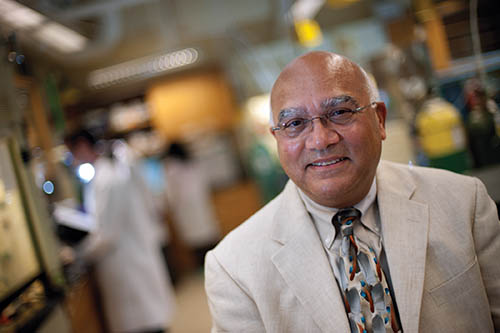Arvind Varma - 2016 Arden L. Bement Jr. Award

Arvind Varma – 2016 Arden L. Bement Jr. Award
Arvind Varma joined Purdue University in January 2004 as the R. Games Slayter Distinguished Professor and Head, School of Chemical Engineering – he was named Jay and Cynthia Ihlenfeld Head in 2012 and continued in this position until July 31, 2016. Prior to joining Purdue, he was the Arthur J. Schmitt Professor of Chemical Engineering and Director of the Center for Molecularly Engineered Materials at the University of Notre Dame. A native of India, he received his Ph.D. degree in Chemical Engineering from the University of Minnesota (1972). He remained at Minnesota for one year as an assistant professor, and was a senior research engineer with Union Carbide Corporation for two years before joining the Notre Dame faculty in 1975. He achieved the rank of full Professor in 1980, received the Schmitt Chair position in 1988, and was named founding Director of the Center for Molecularly Engineered Materials in the year 2000.
Varma’s research interests are in chemical and catalytic reaction engineering, new energy sources and synthesis of advanced materials. He has published over 295 archival journal research papers in these areas, co-authored three books and co-edited two books. As mentor, Varma has directed 46 completed Ph.D. dissertations, and the research of 30 post-doctoral research associates. He is the founding Editor (1996-present) of the Cambridge Series in Chemical Engineering, a series of textbooks and monographs published by the Cambridge University Press.
Varma has held Visiting Professorships at a number of institutions, including Caltech, Princeton, University of Wisconsin, University of Minnesota, Univ of Cagliari - Italy, IIT-Kanpur and UICT-Mumbai. He has received various recognitions for his research and teaching, including AIChE’s R.H. Wilhelm (1993) and W.K. Lewis (2013) awards, and the Chemical Engineering Lectureship Award of the American Society for Engineering Education (2000). He is a Fellow of AIChE and of the American Association for the Advancement of Science.
Selected Topics Related to Energy and Chemicals
Abstract
In the presentation, some selected research programs to produce energy carriers and valuable chemicals from new or renewable sources, currently being conducted or recently completed in my laboratory, will be discussed. These include (i) hydrogen generation for PEM fuel cell vehicle applications, (ii) catalytic upgrading of bio-oils, (iii) utilization of glycerol, a biodiesel waste product, for production of valuable chemicals, and (iv) oxidative coupling of methane. The research relies on development of new catalytic materials and/or processes and demonstrates successful applications of the principles of chemical and catalytic reaction engineering to solve problems of contemporary interest facing society.
Research Accomplishments
Through his creative experimental and theoretical research, Arvind Varma has made pioneering contributions to the chemical reaction engineering (CRE) discipline. Within this field, his publications focus on the understanding, analysis and design of chemical and catalytic reacting systems, synthesis of advanced materials, and new energy sources.
Varma’s early work dealt with analysis of reactor steady state multiplicity and stability, diffusion-reaction in catalyst pellets, yield optimization in complex reaction networks, automotive exhaust catalysis, multiphase reactors, and development of reactor models validated by experiments. Then, in a series of landmark publications, Varma and his coworkers produced the first systematic and definitive works on two subjects of central importance in CRE: (1) optimal distribution of catalyst in pellets, and (2) parametric sensitivity and runaway behavior. His works on these topics are summarized in two scholarly monographs:
- Catalyst Design: Optimal Distribution of Catalyst in Pellets, Reactors and Membranes, 227 pages, Cambridge University Press (2001).
- Parametric Sensitivity in Chemical Systems, 342 pages, Cambridge University Press (1999).
Varma is well-known world-wide for his contributions in combustion synthesis of advanced materials. He developed principles for combustion synthesis and introduced several novel techniques in the literature (e.g. microscopic high-speed videorecording, computer-assisted electrothermography, quenching, and particle-foil experiments), which are used to control the microstructure, and hence the properties, of advanced materials such as intermetallics, ceramics and their composites.
Varma is also a leader in inorganic membranes and membrane reactors. He developed a novel method (electroless plating with osmosis) for synthesis of palladium-based composite membranes, which exhibit higher hydrogen permeability and thermal stability than achieved by conventional techniques. These membranes are used for hydrogen separation from gas mixtures and for obtaining supra-equilibrium yield in reactions involving hydrogen as a product. He also demonstrated elegantly, both by careful experiments and theory, that conversion and yield of commercially important epoxidation and oxidative dehydrogenation reactions can be improved significantly by use of inorganic membrane distributed-feed reactors.
In recent years, Varma has focused his research on energy-related topics, among which the first involves hydrogen generation. He invented an award winning new method to generate hydrogen for portable fuel cells. He has also developed novel methods to generate hydrogen on-board vehicles near PEM fuel cell operating temperatures, which provide the highest hydrogen yield (12-15 wt%) reported in the literature. His publications deal not only with developing new methods and optimizing the operating conditions for maximum hydrogen yield, but also with the reaction mechanisms to provide an understanding of the reasons underlying the high hydrogen yield.
Other recent energy-related topics include underground coal gasification; chemical looping combustion for power plants; utilization of glycerol, a waste product of biodiesel production; lipase catalyzed biodiesel production; oxidative coupling of methane; and catalytic deoxygenation of model compounds in pyrolysis bio-oils.
In addition to his focus on energy research, Varma has also published recently on experimental and modeling studies of trickle-bed catalytic reactors which are commonly employed in the petroleum, chemical and pharmaceutical industries.

